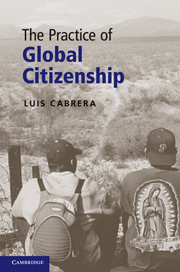Book contents
- Frontmatter
- Contents
- Preface
- Acknowledgments
- Introduction
- Part I Theoretical concerns
- 1 Global citizenship as individual cosmopolitanism
- 2 Rights, duties, and global institutions
- 3 Defining and distributing duties
- Part II Global citizenship in practice
- Part III Advocacy and institutions
- Conclusion: the practice of global citizenship
- Appendix
- Works cited
- Index
1 - Global citizenship as individual cosmopolitanism
Published online by Cambridge University Press: 05 June 2012
- Frontmatter
- Contents
- Preface
- Acknowledgments
- Introduction
- Part I Theoretical concerns
- 1 Global citizenship as individual cosmopolitanism
- 2 Rights, duties, and global institutions
- 3 Defining and distributing duties
- Part II Global citizenship in practice
- Part III Advocacy and institutions
- Conclusion: the practice of global citizenship
- Appendix
- Works cited
- Index
Summary
Many have understood global citizenship simply as synonymous with a cosmopolitan orientation. For example, Derek Heater, perhaps the most prominent student of the global citizenship concept, routinely interchanges the terms global or world citizenship and cosmopolitanism. His 2002 history of the concept is titled World Citizenship: Cosmopolitan Thinking and its Opponents, and cosmopolitanism and world citizenship are presented as equivalent terms throughout (Heater 2002; see also Heater 1996; Carter 1997). The influential volume on world citizenship edited by Kimberly Hutchings and Roland Dannreuther (1999) is titled simply Cosmopolitan Citizenship. Brian Barry declares that “A cosmopolitan is, by definition, a citizen of the world,” and so on (Barry 1999, 35; see Nussbaum 2002a; Brock 2009, 8–9).
Both global citizenship and cosmopolitanism are seen in part as sets of moral understandings that give emphasis to attributes common to all individuals, regardless of their national or other group affiliations. In practice, the cosmopolitan literature has tended to focus on the current global institutional order and injustices it may produce or perpetuate. Theorists of global citizenship have given more attention to the appropriate moral attitudes of individuals toward noncompatriots, or those who do not share their citizenship. Significantly, they have emphasized connective ties, actual or potential, between all individuals in a global human community. As Dower and Williams observe, across a range of global citizenship accounts:
what is being asserted is that humans are in some fundamental sense members of a wider body as contrasted to the membership of a particular political community such as the city-state, nation-state, or even an empire. All the latter are accidents of one’s birth or circumstance. … There is something … that ties us together in terms of identity, loyalty or commitment. (2002, 2; see Dower 2003, 6–7)
- Type
- Chapter
- Information
- The Practice of Global Citizenship , pp. 13 - 33Publisher: Cambridge University PressPrint publication year: 2010

